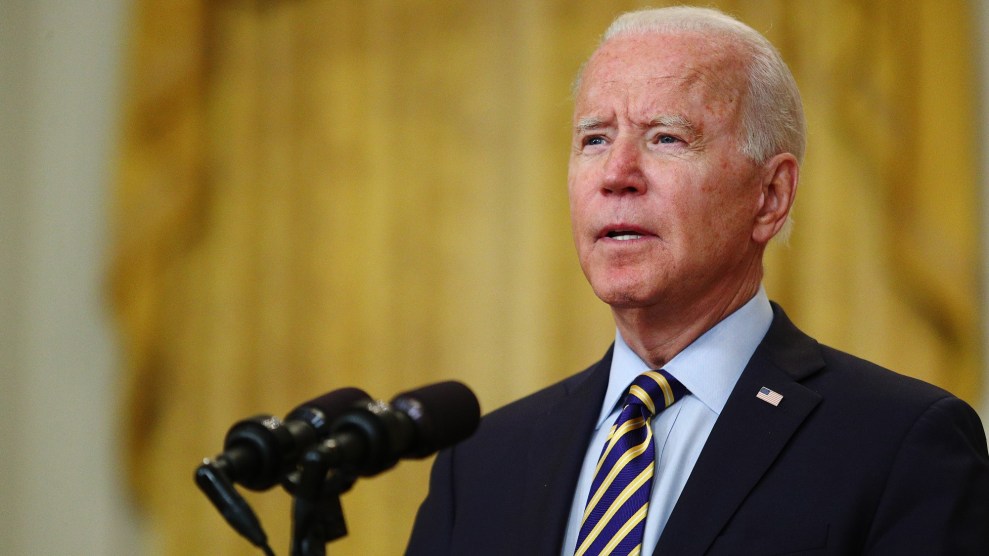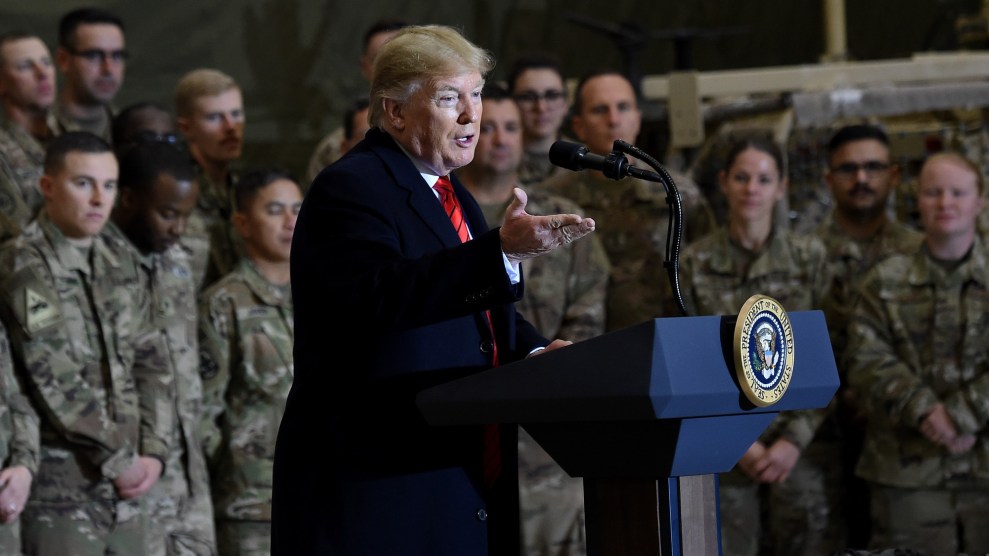
Tom Brenner/Bloomberg/Getty
When Joe Biden defended the US military withdrawal from Afghanistan on Thursday afternoon, he took care to note how “no nation has ever unified Afghanistan.”
“Empires have gone there and not done it,” he said.
No one needs to remind Biden of America’s failure to achieve lasting peace in Afghanistan after two decades of war. The Taliban, which US troops ousted from control after first invading the country, are rapidly assuming control of more parts of the country. A bloody civil war seems certain. When asked if he was ready to declare “mission accomplished,” Biden dodged a repeat of George W. Bush’s infamous photo op and flatly stated, “No, there is no mission accomplished.”
As reporters pushed the president to reflect on the legacy of the the protracted war, it appeared for a moment as if Biden may actually own up to the degree of that failure that happened under his predecessors (including his time as vice president)—a statement of defeat you rarely see explicitly from a sitting US president. But instead he obfuscated.
Asked if he felt the 20-year U.S. military effort in Afghanistan had been worth it, Pres. Biden says the U.S. accomplished its two goals of tracking down Osama bin Laden and eliminating al Qaeda's ability to attack the U.S.
"That job had been over for some time." pic.twitter.com/IPgAepjTya
— ABC News (@ABC) July 8, 2021
“We went for two reasons: one, to bring Osama bin Laden to the gates of hell,” he said. “The second reason was to eliminate al-Qaeda’s capacity to deal with more attacks on the United States from that territory. We accomplished both of those objectives.”
That explanation elides the obvious impact of overthrowing the Taliban, erecting a new government, and attempting to build a civil society that would outlast the US involvement. US forces did not leave when the threat from al-Qaeda receded or when bin Laden was killed. Biden insisted that the United States “did not go to Afghanistan to nation-build,” but that’s precisely why an initial invasion turned into the longest war in American history—one that has seen the US government spend over $2.2 trillion on US military forces or rebuilding efforts in the country.
It is possible to argue for withdrawal without pretending the US involvement in Afghanistan has been anything but a tragedy, which inevitably will continue once troops leave. On Wednesday, White House Press Secretary Jen Psaki did at least acknowledge that the United States is “not having a moment of celebration” at the prospect of leaving.
Even the staunchest backers of Biden’s withdrawal recognize the reality Afghans face in the near future. Weeks before Biden’s withdrawal announcement, Trita Parsi and Adam Weinstein of the Quincy Institute for Responsible Statecraft, which advocates for a non-interventionist US foreign policy, wrote that “Afghanistan is likely to spiral into more violence” whether or not Biden withdraws US forces. “The only variable he can control is whether American soldiers will be the target of that violence or be safe at home with their families.” During his address on Thursday Biden focused on that point, stressing that the quick speed of withdrawal was necessary to protect US troops, while not discussing the ramifications for the Afghans opposed to the Taliban who are left behind.
Biden can credibly defend his decision as the inevitable reality of a failed military effort, a way to cut losses and accept reality when his predecessors could not. But he cannot insist that the United States accomplished its objectives in Afghanistan, unless the plan always was to give the Taliban a gateway back to power. (It wasn’t.)
One lesson of the Washington Post‘s Afghanistan Papers project, which detailed the deceptive ways US leaders portrayed the war to the American public while privately knowing it was doomed, is that the best deception is often directed inwards. You can’t deceive others without first doing it to yourself.

















